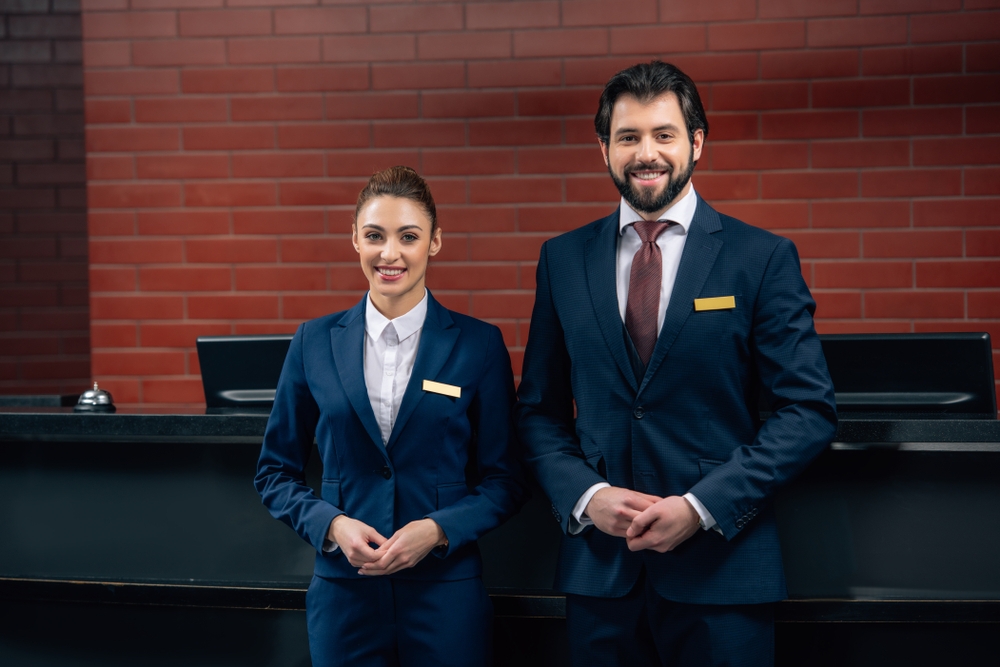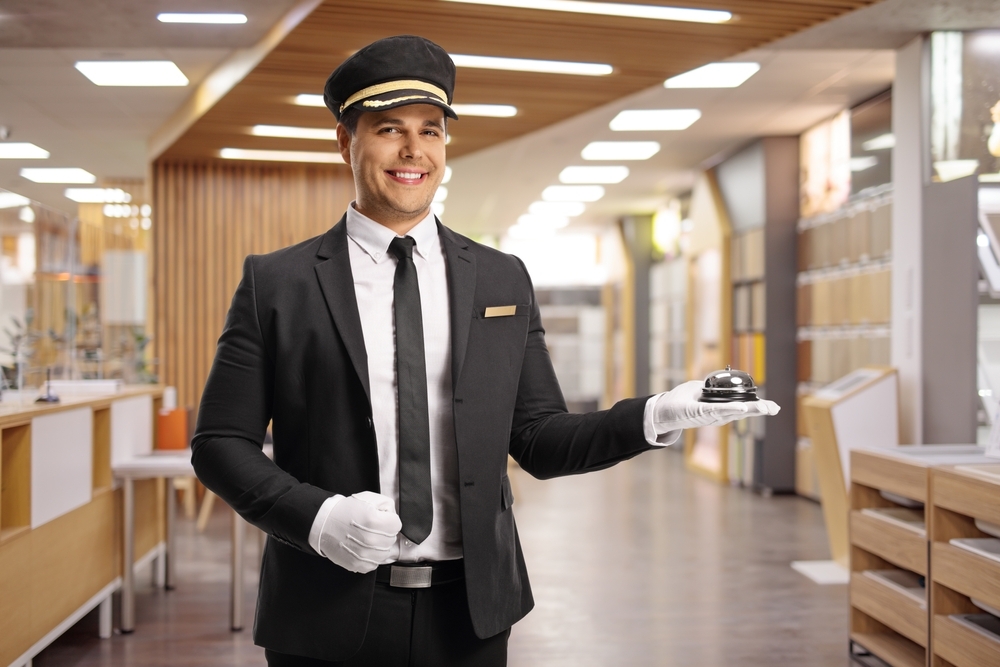Hotel Management Department: Roles, Responsibilities, & Best Practices
By Nikita Nielsen · 29. April 2024
The hotel management department is the driving force behind a hotel’s success.
They’re the ones who manage operations and revenue strategies and handle guest relations. From staffing to keeping guests happy, they make sure everything runs smoothly.
Curious to know how hotel management makes business thrive? Read more in this post that dives into their key roles and the best practices that drive their success.
Key Takeaways
- In the hotel world, all departments play a crucial role in maintaining standards and profitability. To achieve success in the hospitality industry, it’s important to understand their functions.
- Hotel management is responsible for tasks ranging from budgeting and cost control to ensuring staff training and guest satisfaction. They make sure that the entire operation runs smoothly and that standards are met.
- Integrating technology is essential to streamline operations, optimise revenue and stay competitive in the always evolving hospitality scene.
Navigating the Hotel Management Department
 hotel management staff standing together front counter
hotel management staff standing together front counter
Understanding the roles and responsibilities within a hotel’s departments is essential for maximising its capabilities.
The hotel management department is in charge of ensuring smooth operations, guest satisfaction, and maintaining revenue streams.
The key players – Front Office, Housekeeping, Food and Beverage, and Maintenance/Engineering – all contribute to the hotel’s daily operations.
For those looking for a career in the hospitality industry, understanding these key🔑 areas is crucial, as it lays the foundation for success in the industry.
The Role of a Hotel Manager
The hotel manager has the absolute responsibility for ensuring the smooth operation of the hotel. This includes:
- Upholding operational and safety standards throughout all hotel facilities, including accommodations, function rooms, and recreational areas
- Being vigilant, ready to handle any emergencies that may occur
- Supervising staff across all departments
- Addressing and resolving service-related issues
However, the level of interaction with customers and staff may vary depending on the size of the hotel.
In smaller hotels, there may be more direct engagement, while larger establishments may require a focus on administrative tasks.
Strategic Planning & Revenue Management
 hotel company executive presenting management strategy
hotel company executive presenting management strategy
Strategic planning and revenue management are the foundation of financial stability.
Revenue Management Systems (RMS) are key to setting the right room rates for each guest and maximising revenue.
This involves blending revenue management with marketing to create campaigns that are tailored to anticipated needs and opportunities.
The financial stability relies on:
- Strategic planning
- Revenue Management Systems (RMS)
- Marketing campaigns tailored to forecasted needs and opportunities
- Sales teams aligning on pricing, positioning strategies, and group booking paces during revenue management meetings.
This process of setting room rates and coordinating marketing efforts is influenced by factors such as seasonal demand, guest preferences, room availability and market conditions.
Ensuring Guest Satisfaction
A hotel thrives when its guests are satisfied. Human resources play a key role in ensuring customer satisfaction.
They set staff competency standards and transparent performance expectations, which are essential for maintaining service quality and ensuring guest satisfaction.
Regular training of hotel staff is essential to maintain this service quality, including room service, as it has a direct impact on satisfaction levels.
Coordination Among Key Departments
 hotel bellboy
hotel bellboy
From the Executive Housekeeper to the Front Office Manager, leadership collaboration is crucial for setting a cooperative tone and building trust among teams.
To encourage a united team environment, the hotel implements the following strategies:
- Cross-training sessions and full-day orientations help staff understand the roles and challenges of other departments.
- Daily meetings involve all departments, allowing for open communication and collaboration.
- Celebrating common achievements, reinforcing a shared sense of purpose and building a collaborative culture.
The Front Office department plays an important coordinating role by communicating with Housekeeping for updates on the status of rooms and with Maintenance for necessary repairs.
Synchronising Front Office Operations
The Front Office department, also known as the front office hotel department, is the first and last point of contact for guests.
This department sets the tone for their stay and impacts overall guest satisfaction and the hotel’s public image.
Its operational functions include:
- Managing reservations
- Check-ins
- Check-outs
- Assigning rooms
- Handling payments
- Taking care of guest requests, queries, and complaints
All of these functions are essential to maintaining a high level of guest satisfaction.
Positions such as receptionist, guest services representative, front office manager and concierge focus primarily on customer service, ensuring guests’ needs are met quickly and professionally.
Coordination with the reservations department is key as it handles:
- Making and adjusting hotel bookings
- Keeping room availability updated
- Communicating with travel agents and tour operators
- Optimizing room sales, which directly contributes to the hotel’s revenue and guest satisfaction.
Overseeing Housekeeping Standards
The housekeeping department ensures cleanliness and maintenance of all hotel spaces including guest rooms and public areas. Their primary functions involve:
- Room cleaning
- Public areas maintenance
- Linen management
- Restocking of supplies
For efficient cleaning🧹 services, housekeeping stations and supply closets are strategically located on every floor and may also be centralised in back-of-house areas, ensuring the maintenance department can easily access necessary supplies.
Managing Food and Beverage Excellence
The food and beverage department, including the food production department, serves as the culinary hub of the city.
F&B managers coordinate and communicate effectively with hotel management to improve food service. Their main tasks are:
- Purchasing produce
- Pricing menus
- Managing orders
- Customer service
These responsibilities are essential for exceptional dining experiences. This department has a significant impact on hotel revenue, making it crucial for the management to ensure its success.
Effective procurement plays a critical role by targeting major revenue items such as food and liquor, which make up a substantial portion of procurement costs.
POS technology is integral to the F&B department for streamlining payments and managing information like inventory, which aids in maintaining high levels of service quality.
Human Resources and Staff Development
 hotel restaurant staff learning to distinguish between glasses
hotel restaurant staff learning to distinguish between glasses
The human resources department is the backbone of the hotel’s workforce. It performs several important functions, including:
- Recruiting staff
- Assigning staff to appropriate roles
- Ensuring staff possess the necessary skills for efficient service
- Supporting employees in their professional development and helping them acquire skills that enhance their performance
- Celebrating success and acknowledging achievements across departments to motivate staff and foster a cooperative and positive work environment.
The security and maintenance department also plays a key role in planning maintenance and events, thereby contributing to maintaining the hotel’s standards and enhancing staff engagement.
Training Programs and Employee Growth
Training programs serve as the educational institutions within hotels. HR managers organise these programs to integrate customer service skills, supporting the professional growth of all employees.
Competency-based training covers various skills, including:
- management
- housekeeping
- food and beverage
- front-of-house operations
These skills are essential for comprehensive staff development. Effective staff training organised by hotel HR departments is vital in maintaining staff competence and preventing productivity losses and negative guest experiences.
During onboarding, hotels conduct training programs covering job responsibilities, use of cleaning tools, and policies and procedures.
Training providers offer tailored solutions aligned with hotel needs and brand values, ensuring relevance and impact.
Cross-training staff in different departments fosters understanding and empathy for diverse hotel roles.
Financial Oversight and Administration
 Black Calculator Near Ballpoint Pen on a Paper
Black Calculator Near Ballpoint Pen on a Paper
The financial department of a hotel is its treasury, ensuring the city’s economic stability. Hotel financial controllers are responsible for:
- Maintaining internal controls
- Safeguarding assets
- Accurate transaction recording
- Providing relevant management information
- Ensuring compliance with statutory requirements.
The accounting department, also known as the finance department, oversees all financial transactions.
This includes processing invoices, generating budget reports and managing payroll. Hotel managers monitor income and expenses, manage budgets responsibly and aim to optimise profits for the hotel.
Budgeting and Cost Control
Hotel managers are responsible for consistently tracking the hotel’s financial activities, which includes both income and expenses.
Staying within the allocated budget requires hotel managers to make timely adjustments based on their regular financial monitoring.
Financial Reporting and Analysis
Financial reporting and analysis are crucial for auditing purposes within hotels. Advanced features in hotel accounting software help managers make informed decisions by providing rigorous expenditure management. Hotel accounting software offers:
- Real-time dashboards
- Advanced reporting capabilities
- Enables managers to monitor financial performance and recognize trends that guide strategic planning
Benchmarking a hotel’s financial performance against similar establishments allows hotel managers to confidently address budgeting and cost-control issues.
Hotels conduct annual audits and implement follow-up audit plans to ensure financial protocols are followed and financial integrity is maintained.
Special investigative audits🔍 are conducted as needed to maintain strict financial control and oversight of hotel operations.
Handling Financial Aspects of Operations
In a hotel, the HR department oversees payroll administration, which includes developing company policies, ensuring compliance with labour laws, and administering compensation and benefits.
Sales, Marketing, and Public Relations
The sales, marketing, and public relations teams serve as ambassadors for the hotel, promoting it to attract visitors.
The hotel management department collaborates with stakeholders such as revenue management, sales, operations, and marketing teams to enhance the hotel’s visibility.
Marketing within a hotel focuses on creating and maintaining a positive public image, branding, and promoting the hotel through social media and PR.
Through close collaboration, the sales and reservations department works with the marketing department and senior management to increase room bookings and revenue.
Developing Marketing Campaigns
City promotion campaigns help attract visitors and residents alike.
Personalising marketing campaigns to guests’ preferences and travel patterns is key to attracting desired market segments.
Hotels utilise branding and social media strategically within marketing campaigns to maintain and improve their public image.
Collaborating with Sales Teams
The sales and marketing department in hotels work together with the management and Sales and Reservations departments to enhance market strategies and boost room bookings.
Tailored marketing campaigns aimed at B2B customers are developed using data and insights from the sales team, which helps in creating effective targeted communications.
The hotel’s marketing strategies involve engaging potential customers by placing competitive advertisements in the market and attracting planners and guests from sister markets or competing locations.
Technology Integration in Hotel Management
In today’s digital era, hotels need to embrace technology in order to succeed. Hotel accounting software enables real-time monitoring of costs and revenues, facilitating effective budgeting and cost control.
Management information systems provide data to guide business strategies and improve performance.
Introducing technology into hotel management can lead to long-term cost savings and increased profitability.
Property Management Systems (PMS)
A Property Management System (PMS) plays a crucial role in hotel operations by centralising various critical functions. The main functions of a PMS include:
- Handling reservations
- Processing payments
- Managing inventory
- Providing performance analytics
These functions contribute to efficient management of room reservations, seamless payment transactions, accurate tracking of inventory, and the ability to analyse operational performance.
Implementing Revenue Management Systems (RMS)
A Revenue Management System (RMS) is essential for hotels to implement dynamic pricing strategies that adapt to market demand and competition.
RMS predicts demand and recommends optimal pricing, contributing significantly to a hotel’s financial success🚀.
Key features of an effective RMS include real-time data analysis, competitive price shopping and integration with the hotel’s Property Management System (PMS).
When choosing an RMS, it is important to consider the hotel’s specific needs and compatibility with existing technology.
Summary
In conclusion, a successful hotel relies on effective coordination between hotel departments.
From the front desk, which sets the tone for the guest experience, to housekeeping, which ensures cleanliness, each department plays an important role.
Leading the charge is the hotel manager, who oversees operations and makes strategic decisions.
The hotel industry is all about providing guests with a memorable experience, and it takes the entire hotel team working together to achieve that goal.
Frequently Asked Questions
What are the main departments in a hotel?
The main departments in a hotel are the Front Office, Housekeeping, Food and Beverage, and Maintenance/Engineering. These are the key departments responsible for the overall operation of the hotel.
What is the role of a hotel manager?
The role of a hotel manager is to oversee operations, supervise staff, and ensure operational and safety standards are met.
What is the importance of technology in hotel management?
Technology is crucial in hotel management as it helps streamline operations, improve guest experiences, and optimise revenue through systems like PMS and AI.
How does a hotel’s HR department contribute to its success?
A hotel’s HR department contributes to its success by recruiting and developing staff, administering internal systems, and ensuring a positive work environment for employees. This is essential for staff competence and overall success.
How do sales and marketing contribute to a hotel’s success?
Sales and marketing teams contribute to a hotel’s success by increasing visibility, creating a positive public image, and boosting room bookings through personalised campaigns and social media strategies. This ultimately drives more business and revenue for the hotel.

